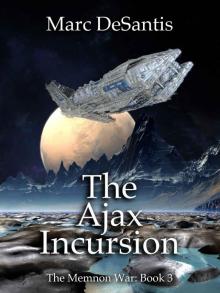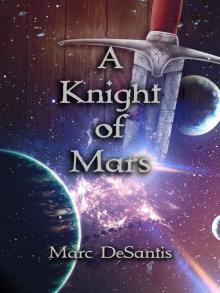- Home
- Marc DeSantis
The Memnon Incident: Part 4 of 4 (A Serial Novel)
The Memnon Incident: Part 4 of 4 (A Serial Novel) Read online
The
Memnon
Incident
Part Four of Four
Marc DeSantis
This book is a work of fiction. The characters, incidents, and dialogue are drawn from the author's imagination, and are not to be construed as real. Any resemblance to actual events or persons, living or dead, is entirely coincidental.
Copyright © 2017 by Marc DeSantis
All rights reserved. No part of this book may be used or reproduced in any manner whatsoever without written permission, except in the case of brief quotations embodied in critical articles and reviews.
Chapter Twenty-Nine
Commander Callisto Imagawa rolled her Wildcat. The machine reacted sluggishly. It was missing one engine, and its gravitic maneuvering vanes had been shredded by high velocity gauss pellets and seared by laser fire. Try as she might, she could not escape the Memnonian fighters that circled around her. As always, the Wyvern of Commander Alexander Mendel remained behind her Wildcat, always holding tight in a position to strike. He was one hell of a pilot, Imagawa thought. He had probably received instruction in Halifax as part of one of the officer exchange programs that the RHN ran with "friendly" navies. Once she was dead, Imagawa promised herself that she would haunt the Navy morons who had instituted such things. Scare them while they were on the toilet. That would be best.
The threat warning receiver had blared for so long and so loudly that Imagawa had turned the damned thing off. No point in having that ear-splitting drone be the last thing she ever heard. She checked her scope once more. She keyed it so that its two-dimensional display switched to three. At a distance of twenty thousand kilometers, she saw Percy's tiny blue icon intersect with that of a Memnonian P-9 Walrus, a Halifaxian-manufactured patrol craft used often for search-and-rescue duties. At least he would live. She didn't envy Percy his stay in a Memnonian prison, but it would be better than being dead.
There came another message from Mendel. "I offer one last opportunity to surrender, Halifaxian. I admire your skill. There is no need for more bloodshed."
"Only blood that's been shed today has been Memnonian."
"You are a charming one!" Mendel laughed. "And I had thought Halifaxians to be so bland."
"Surrendering to lords and princelings is not the Halifaxian way," Imagawa said. "Your offer of hospitality as your dungeon captive is not appealing to me."
"We are not Ajaxian barbarians, no matter what you may have heard of us," Mendel countered. "We don't have dungeons, for your information. We are simply not as technologically advanced as you of Halifax."
Imagawa dove steeply, so that she was heading once again, she found, in the direction of Steadfast and the rest of the 34th Strike Squadron. The Wyvern had no trouble keeping up with her fighter. Mendel settled in behind her, mirroring her every feint. His machine was intact while hers was badly damaged. There was nowhere for her to run. The other Memnonians had again taken positions around her, boxing her in. Her scope now showed that ten more fighters were heading towards her. Reinforcements sent from some other Memnonian warship, most likely. Her show had come to an end. Mendel probably wanted to take her alive for whatever propaganda value her presence would have when they conducted the show trials of her and Percy as pirates. No thank you, Commander Mendel!
There came a series of bright flashes, startling in their intensity. Could Captain More be fighting the Memnonians? Maybe she was seeing the light produced by the detonations of the antiship missiles that each side was lobbing at each other.
"You've made your choice, pilot," Mendel said. "You have left me none."
The Wyvern came up directly behind her own fighter. Her Wildcat's rear-facing camera showed that the Memnonian machine had closed to within just five hundred meters. Mendel was going to do this with his guns. Such a stodgy traditionalist!
A Memnonian fighter in front of and above her Wildcat erupted in a ball of fiery gas. Next, the remaining F-215 and a Black Dragon became fireballs. Mendel's Wyvern had disappeared from her stern. Another machine, the lone Typhoon, exploded, its debris expanding in a noiseless cloud. The other Memnonians peeled away and fled in all directions. The ten fighters in the distance began broadcasting Halifaxian identify-friend-or-foe codes.
A familiar voice broke over her comm. "Witch? That you?"
"Salad!?" It was Lieutenant Daniel Yee.
"Yes, and I have brought nine friends." The Golden Sabers had come to her rescue.
"It's about time! That was close. But where do we go?" Imagawa asked. "Captain More's jumped out of the system."
Not yet." replied Yee. "We received a transmission. He's short-jumping deeper in-system. Our relations with Memnon have gone south. It's a flat-out shooting war now."
"What's happened to Morrigan?"
"She's back and has raised her shields. Last we knew, she was tractoring the mines we hit when we jumped into this system. They were headed for the RMN. Captain More got the hell out there, just in case."
"There were a lot of mines in that field."
"She was pulling hundreds of thousands of them."
"Wow! The Memnonians won't stand a chance if they don't clear out." Imagawa felt a slight twinge of pity for the Memnonians, but then returned her thoughts to more immediate concerns. "We need to get Hammer back! That P-9's got him!"
"We're already on it, commander. I sent Twist, Grumpy, and Tears to scare the crap out of it. It will be following us back soon enough," Yee promised.
There was a massive series of flashes originating in the direction of the last known coordinates of Morrigan. The flashes continued over the course of a little less than one minute.
Lieutenant Hideki "Coffee" Collins spoke up first. "We are at war."
"We have been for some time," Imagawa said. "Whatever happened up ahead, it can't have been good for the RMN."
There were a few seconds of quiet as the Golden Sabers digested what they had witnessed. At last, Yee said, "What we just saw took place about a minute ago. It will be hours before we reach the site, even pulling high g's. Steadfast's our only way out of the system, and Captain More said he would return as fast as he could. We'll have to wait for him there."
"We'll be going back, all in good time," Imagawa said. "Let's retrieve our good man Hammer first."
Aboard Morrigan, Memnon system
"Anyone got an idea where we are?" Howell looked out the blastglass windows on the bridge. "I didn't spend much time studying the constellations as seen from Memnon. The stars all look the same to me. We couldn't have gone far. We weren't in hyperspace for very long."
Chandler came up and stood beside Howell. "I doubt we have left the system."
"Morrigan is making war," Venn said. "I think she jumped someplace where she could continue the fight."
"What if. . . uh oh." Howell looked stricken.
"Uh oh? Why 'uh oh'? Venn asked.
Howell could only point. Rising up in the distance was one of the more recognizable planets in the Great Sphere. A blue-green orb with cottony white clouds and azure oceans. It was said to be a world that resembled very closely Lost Earth in its days of glory and was one of the most popular destinations for interstellar tourists.
"Is that Tiryns?" Chandler asked. He already knew the answer.
"The capital of the enemy," Morrigan announced with satisfaction.
Aboard RHS Steadfast, Memnon system
"Feeney, report," More demanded once the Steadfast emerged from hyperspace.
The young lieutenant made several small gestures across her holodisplay, causing it to zoom out to encompass a volume of space three thousand kilometers in diameter. "All ships
have successfully displaced."
The simultaneous displacement of the seven ships of the 34th Strike Squadron had seen them jump closer to the star known as Memnon. They were still well outside the orbit of the furthest planet from the system's primary, but that was of little interest to More. His ships had all escaped the death zone that Morrigan had turned the space around their previous coordinates into a few seconds before.
"No damage at all?"
"None yet that the others are seeking to report," Garand said. "Wait, please." He clutched his earpiece. "Tightbeam transmission from Golden Lion, captain."
"Put him through."
The face of Vincent Vokey, executive officer of the Steadfast and now acting captain of the Golden Lion, materialized on the viewscreen at the fore of the bridge.
"I'll be ready to go in an hour," Vokey said. "I could really use some extra time, though. Golden Lion has never been the same since she was hit when we came to Memnon and displacement reactors don't like being used so often."
Vokey was right. Displacement was fast, but the preparation for displacement was not. It involved extensive calculations which had to be made with extreme precision. What took the most time, however, was the creation of the displacement envelope around the jumping ship. That was usually measured in hours and required enormous energy to sustain. A crash displacement was always possible, but those were extremely dangerous. Most ships that went missing disappeared after some kind of hasty jump had been made without the right calculations or properly erected envelopes around them. Tommasina Carey, a tigress of a captain, had risked her ship when she had raced home to bring word of the Morrigan find to Halifax. Had something gone wrong while she was in transit, her ship might have been lost in hyperspace or destroyed.
Vokey's face vanished from the screen. Shortly after, Rahal and Heyward popped in via hologram, and their bluish-white, three-dimensional images came to stand beside More on the bridge of the Steadfast. "We're good to go," Heyward said. "So are we," Rahal added.
"Good to hear," More said. "I want to get back as soon as possible. The Golden Sabers are still out there. They went to the rescue of their CO before the fight began. They are to rendezvous with me at our previous location. I'm not going to leave without them."
"Trouble is," More continued, "Vokey's ship's reactor is weak, and it isn't smart to push our own until we've made all the necessary repairs and calculations."
"And you're worried that someone else will arrive on scene to catch the Golden Sabers before we can jump back?" Heyward said.
"Right. We're seconds away in jumptime, but at sublight at least ten hours," More said. "We don't know who or what else was on their way to join with the RMN."
"We'll do a hard burn then," Rahal said. "We can push twenty g's, which would be a felt three. Unpleasant, but most of my crew will stay in cryo, as will yours."
"Okay. Hard acceleration. But I want you, Tyler, to stay with Vokey. If he has to fall out for any reason, you cover him."
"Understood."
"Let's do it," Heyward agreed.
"Flashes, captain," Feeney announced. "From our previous coordinates."
"We're reading them also," Heyward said.
"Onscreen, lieutenant," More said.
There were dozens, then hundreds, then thousands of flashes. The light produced by the nuclear detonations and the subsequent explosions of the Memnonian ships had arrived.
"It does not look like things went well for the RMN," Heyward deadpanned.
"No, they did not."
The holograms of the two captains faded from view. The maneuver drives of the Steadfast began to glow as reaction mass was expelled from them. The heavy cruiser had not jumped with much native velocity, having stayed relatively immobile as it had defended Morrigan from attack by the Memnonians. The felt acceleration of three times gravity was uncomfortable under the best of circumstances, but he could not allow his brave pilots to return to find their ships gone.
Chapter Thirty
Lieutenant Arjuna Donner's time aboard the ATS Triumph had been the most exciting four weeks of his life. His orders from Admiral Otis had forbidden him from entering cryostasis but he would not have done so under any circumstances even if it had been allowed. He had not once been bored during the long journey from Tartarus. Donner had dreamed of serving with the Armada since he was a boy. The Triumph, resplendent in red and gold and the flagship of the fleet, was the most prestigious and powerful vessel in the navy. It possessed all of the amenities that a capital ship could offer, being more of a city in space than a mere spacecraft. Let other sailors ply the void in lesser ships, Donner was now convinced. There was nothing that could compare with the grandeur and quality of life that he found aboard Triumph.
The first ship of the Triumph class of battleships, she had been designed as a response to the Black Eagle class that Halifax had launched a decade before. Republican technology was still slightly ahead of that of Tartarus, as the Halifaxians, unjustifiably lucky people that they were, had the benefit of what they had learned from the recovered Cordelia and Lady of the Lake. Tartarus had to make do without examples of functional ancient warships in front of them to develop their technology. Donner allowed that - just perhaps - the Halifaxians had also innovated some things on their own, here and there, using their own native intellect, and had not merely reverse-engineered the old ships from the Time Before. Most of their edge over Tartarus had to have come from the antiquakraft warships, however.
The Triumph massed a little more than ten million tons and was the biggest ship yet brought into service by any Great Sphere navy, barring the Lady of the Lake. The Review of Ships, a public-source Halifaxian journal that tracked the warships of the various fleets in the Sphere, had grudgingly acknowledged that it was 'a leap forward in Tartarean battleship design.' A 'leap forward?' In only 'Tartarean battleship design?' Ha! Donner chuckled to himself. The Armada had been forced to come up with novel solutions to its design challenges. It did not have the benefit of cracking open a more advanced ship from a bygone age to learn how others had solved them before.
Donner grew bitter when he thought of the recovered antiquakraft that had been squandered by the traitors who had initiated the wrongheaded mission in Memnon. He could conceive of no good that would come out of it. Its only purpose seemed to have been to involve Memnon in a war with Halifax. But what use would that be to the Monarchonate? King Evander had himself said that the time was not yet ripe for war with the Republic. If Memnon had come to Tartarus looking for an ally, and Tartarus had agreed to an alliance, that would have meant war with the Halifaxians, who were still the strongest people in the Sphere.
Lost in the Black Moon debacle was the displacement emissions analyzer, a tracking system of unparalleled sophistication. In addition, the Black Moon's antiquakraft displacement drive, so powerful that it granted nearly fifty percent better hyperspeed to the ship, was gone too. Had they been retained for study, they would likely have revealed a myriad of technological secrets that would have brought significant advantages to the Armada.
Donner took out his compad and began to tap away furiously at the holographic keyboard. It was important that he keep all of his thoughts and observations organized for the admiral. Otis thought highly of him, he knew, or else he would not have sent the lieutenant on such an important mission. He was not happy that he was something of a spy aboard Triumph. He admired Captain Acton, a patriotic Tartarean if there ever was one. He would much rather that his messages be sent out via normal channels, but Donner reasoned that Admiral Otis needed his intel to reach him directly and quickly. Donner was the best person to relay what he saw once he reached Memnon. He looked at the small and weighty briefcase that the admiral had given him right before he departed Victory base. Triumph, and the rest of the Engagement Force that had accompanied her to Memnon, the heavy cruisers Splendid and Invincible, the light carrier Noble Heart, the destroyers Amity and Endurance, and the couriers Hasty and Gazelle, would be breaking f
rom hyperspace soon. He mentally reviewed the capabilities of the elements of the flotilla. It was a habit he had developed while a cadet at the Armada's Naval Academy at Trondheim. Always know what you have, what your ships can do, so that you can react to any threat with the most appropriate response. His skill in this exercise had been honed through countless hours of wargaming. Donner had always been interested in naval warfare from a military historical perspective, and he had refought, via simulation, every single battle that had been fought in the Great Sphere over the last thousand years. He had also acquired pirated copies of simulations run at the Halifaxian naval academy at Cold Bay. These he especially prized, as they allowed him to make use of Cordelia and Lady of the Lake as components of his battlefleet.
He was unsure whether he could trust the veracity of the simulated ancient warships. These were Halifaxian programs he was running, and he would not put it past the Halifaxians to purposely diminish the capabilities of those ships to hide them from foreign intelligence services. The Armada routinely underreported the armaments and speeds of its own major warship classes. There was no need, its admirals reasoned, to allow a potential enemy to know just how strong and fast the navy's vessels actually were. Accurate figures would only find their way into the public domain once the ships they were attached to were a generation out-of-date. The suddenly improved weapons and performance characteristics of the aging warships would then be hidden through the subterfuge of attributing the boost to overhauls and refits. Tartarean manufacturers were then free to seek customers for their slightly outdated wares with genuine product information.
Donner's analysis started, as it necessarily had to, with the Triumph. A battleship was the core of any battlegroup that included one and could dish out as much firepower as three, perhaps four, heavy cruisers. It was certainly more survivable than any other ship it might encounter barring another battleship. Triumph was just two years old, and it still retained the smell of fresh paint and unscuffed corridors. Ships tended become worn internally as crews banged, scratched, soiled, stained, and dinged everything in sight. Triumph, though, as the Armada's flagship, had not been committed to just any crewmen. Instead, only the best were allowed to serve aboard her. Triumph was, therefore, no one's first assignment. Simply asking for the chance to be a member of the crew required the completion of duty assignments on two other ships. Donner, therefore, had been taken aboard only by the express order of Admiral Otis. There were none who would gainsay him, even though Donner had never been to space since graduating from the Academy. He had a mission to accomplish.

 The Ajax Incursion
The Ajax Incursion The Memnon Incident: Part 2 of 4 (A Serial Novel)
The Memnon Incident: Part 2 of 4 (A Serial Novel) The Memnon Incident: Part 4 of 4 (A Serial Novel)
The Memnon Incident: Part 4 of 4 (A Serial Novel) The Memnon Incident: Part 1 of 4 (A Serial Novel)
The Memnon Incident: Part 1 of 4 (A Serial Novel) A Knight of Mars
A Knight of Mars The Memnon Incident: Part 3 of 4 (A Serial Novel)
The Memnon Incident: Part 3 of 4 (A Serial Novel)